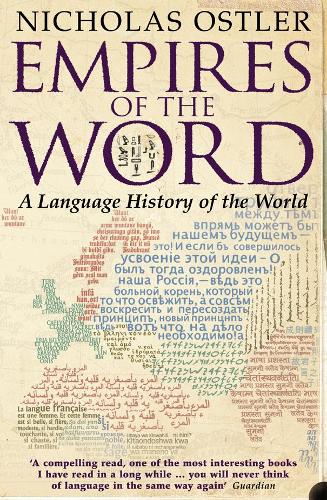
Empires of the Word: A Language History of the World
(Paperback)
Publishing Details
Empires of the Word: A Language History of the World
By (Author) Nicholas Ostler
HarperCollins Publishers
HarperPerennial
3rd January 2007
18th September 2006
United Kingdom
Classifications
General
Non Fiction
Language: history and general works
Sociolinguistics
General and world history
History of ideas
Historiography
Globalization
417.7
Physical Properties
Paperback
688
Width 153mm, Height 234mm, Spine 45mm
720g
Description
An unusual and authoritative 'natural history of languages' that narrates the ways in which one language has superseded or outlasted another at different times in history.
The story of the world in the last five thousand years is above all the story of its languages. Some shared language is what binds any community together, and makes possible both the living of a common history and the telling of it.
Yet the history of the worlds great languages has rarely been examined. Empires of the Word is the first to bring together the tales in all their glorious variety: the amazing innovations in education, culture and diplomacy devised by speakers in the Middle East; the uncanny resilience of Chinese throughout twenty centuries of invasions; the progress of Sanskrit from north India to Java and Japan; the struggle that gave birth to the languages of modern Europe; and the global spread of English.
Besides these epic achievements, language failures are equally fascinating: why did Germany get left behind Why did Egyptian, which had survived foreign takeovers for three millennia, succumb to Mohammeds Arabic Why is Dutch unknown in modern Indonesia, given that the Netherlands had ruled the East Indies for as long as the British ruled India
As this book engagingly reveals, the language history of the world shows eloquently the real characters of peoples; it also shows that the language of the future will, like the languages of the past, be full of surprises.
Reviews
'It is a compelling read, one of the most interesting books I have read in a long while ! a great book. After reading it you will never think of language in the same way again.' Guardian 'Learned and entertaining ! remarkably comprehensive as well as thought-provoking.' Observer 'Ostler is particularly good on this linguistic fragility ! This richly various book offers new insights and information for almost everyone interested in the past.' Sunday Telegraph 'A serious work of scholarship, but one that can be read from cover to cover by the amateur enthusiast!the breadth of this analysis is breathtaking ! it does its job admirably.' Spectator 'Ambitious and well-researched.' New Statesman
Author Bio
Nicholas Ostler is a scholar and scientist of languages, who has a working knowledge of twenty-six languages and who, five years ago set up the Foundation for Endangered Languages, an international organisation to provide funding and support to document and revitalise languages in peril. With his own company Linguacubun Ltd., he regularly advises governments and corporations on policy in the field of computers and natural language processing. He is the author of the highly acclaimed Empires of the Word: A Language History of the World and most recently Ad Infinitum: A Biography of Latin published by HarperCollins in 2007.
